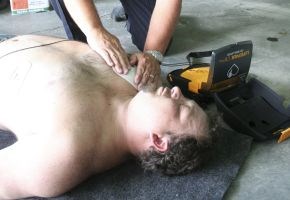Ray Coutu said he hopes Laurentian University staff will never have to use any of the institution's five new defibrillators on a live person. But it's important to be prepared in case of an emergency, he said.
“God forbid we ever need them, but at least now we're going to be able to try to save someone having a heart attack on our campus,” said the university's manager of purchasing and risk management.
The university recently purchased five Zoll automated external defibrillators. They cost about $2,000 each. The odds of surviving a heart attack outside of a hospital increase by 50 percent if there's a defibrillator nearby.
The devices are located throughout the university – at the gym in the Ben Avery Building, the pool, the health services centre in one of the residences, and in security officers' vehicles. Lifeguards, security officers and health services staff have been trained to use them.
“That was very important to us - to have everybody in those areas trained,” said Coutu. “The worst thing is to have these things and not have the training.”
The devices are designed to be used in conjunction with CPR.
They can be used by people who have minimal medical training because they “speak” to the operator, talking them through the procedure.
Electrodes are placed on the patient’s chest, and the control computer assesses the patient, determining whether or not a shock should be administered.
The device stops ventricular fibrillation, a state of electrical chaos in the heart’s conduction system, which minimizes or stops blood flow. The shock depolarizes electricity in the heart, allowing it to function normally.
Portable defibrillators are also onsite at several other large organizations in Greater Sudbury, including Inco Ltd., Cambrian College, College Boreal and provincial buildings. All of the city’s ambulances and fire trucks also equipped with the devices.
None of the buildings belonging to the City of Greater Sudbury, including arenas, have the devices.
Recently, at an old timers hockey tournament in North Bay a player suddenly fell unconscious due to cardiac arrest. The man survived because the arena a defibrillator was used before paramedics arrived.
"None of the arenas in Greater Sudbury have them," said Ray Mensour, manager of arenas for the City of Greater Sudbury. "This is an issue that needs to be addressed by the city," he continued.
Joseph Nicholls, chief emergency medical services, said while city staff has discussed this issue, so far no plan for a defibrillator program is in place.
Though the arena itself does not have defibrillators, Mensour explained that each OHL team in the league has a portable defibrillator and trained medical personnel on hand in case a dangerous situation should arise.
For all events including OHL games, the arena relies on city emergency services.
"All fire trucks and emergency service vehicles in the City of Greater Sudbury are equipped with defibrillators, and EMS systems have quick response times," said Nicholls.
Even if a defibrillator is available during an emergency, calling 911 and seeking medical attention is still the most important step.
-With files by Angele Dubois
